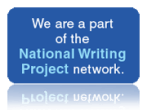From the Classroom: Dedicating Daily Time to Reading Conferences
By Lauren Heimlich Foley
My eighth graders buzz with enthusiasm as they talk about their independent reading books. They yearn to reveal the adventures they take in the quiet of their minds: they seek the opportunity to discuss stories, characters, conflicts, themes, and techniques with another person. Reading conferences foster these academic conversations.
We start every class with ten to fifteen minutes of independent reading. During this time, I talk with five to seven students. By the end of the week, I have conferenced with each student at least once. Together, we assess reading progress, reflect on author craft, promote empathy, and engage in higher-level, critical thinking. Students push their thinking beyond the text, connecting their books to their own lives, other texts, and the world.
Staying Organized
Keeping track of this information can be tricky. This year I am experimenting with Word documents that track my students’ pages read: I record books they interview, read, abandon, and finish. So far, it is more effective and convenient than the paper spreadsheets I used to print out. Now, I can rearrange students based on their seats, learning needs, and conference dates. I color code student names to guide our future conferences—green means a student should finish a book within the week; yellow reminds me to check in with the student again before the week’s end; and red indicates that a student is not meeting their reading goal. My notes may appear messy–no italics and misspellings–but they are extremely helpful. To keep track of dates, I save an updated document each week. As students finish books, I delete the title for the following week. For students, who are struggling to find the right book or are not meeting their goal, I keep their running record from week to week to help me guide them to success.
Questions to Ask
I have also learned that the questions I ask my students play a key role in their growth. Nancie Atwell’s The Reading Zone and Penny Kittle’s Book Love guide my conference questions. I always ask students if they like the book and how their reading is going. I often follow up that question with the book’s rating on a scale from 1-10. My students’ answers help me determine whether or not a book is a good fit for them.
Additionally, I develop follow-up questions that push my students’ thinking further. They fall into various categories:
- Comprehension
- Vocabulary
- Close Reading and Re-Reading
- Skills Application from Whole-Class Minilessons (e.g. theme, conflict, visualization, dialogue punctuation)
- Evaluation (e.g. favorite part or most important moment)
- Connection (to self, other texts, and the world)
- Read Like a Writer (e.g. figurative language, sensory details, character thoughts)
- Reading Together
- Next Book
While some weekly conferences simply check student progress, others lend themselves to one-on-one direct instruction. My students’ reading and writing needs as well as where they are in the book help me determine what direction our conversations will go. Oftentimes, a conference will include two or more of the categories listed above. Because I can differentiate the questions, reading conferences support and challenge all of my students regardless if they are in Reading Support, Academic English, or Advanced English.
Having the opportunity to listen to my students talk about their books is one of my favorite parts of our class. I hope you enjoy chatting with your students about their books! If you have additional go-to questions or conference types, please post them below. If you have questions or would like to share your own experiences, we would love to hear from you.







